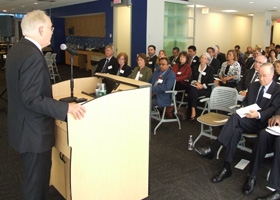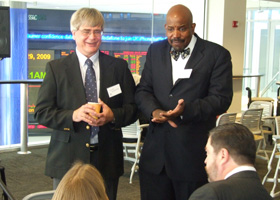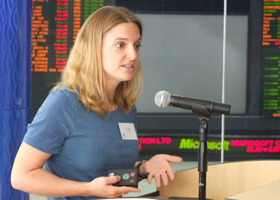Feature Story
Health Center Today, October 6, 2009
Health Center Launches Research Consortium with Eye on Crucial Grant
By Chris DeFrancesco

President Michael Hogan addresses invited guests at the launch of the Connecticut Institute for Clinical and Translational Science Sept. 29 at the Graduate Business Learning Center in Hartford.
An alliance of local health care providers is backing the UConn Health Center as it pursues a major grant from the National Institutes of Health.
UConn formally launched the Connecticut Institute for Clinical and Translational Science at the Graduate Business Learning Center in Hartford September 29. CICATS is a biomedical research collaborative that includes regional hospitals and community health care organizations.
“This partnership transcends the traditional boundaries of our individual organizations to create a single, effective, efficient research consortium,” says UConn President Michael Hogan. “It's the path that biomedical research must take if Connecticut is to remain a significant player on the national research platform.”
"Over time, we've learned that success in research is really about a broad-based team effort, and that the future involves the entire region working together in service to humanity," says Dr. Cato T. Laurencin, vice president for health affairs and medical school dean. "CICATS was created to coordinate and integrate efforts in the broad community of health care institutions and practitioners in the Hartford metropolitan area, and to link these efforts to a national CTSA consortium."
CTSA is the Clinical and Translational Science Award from the NIH, for which Laurencin is serving as principal investigator. Hogan says funding of the grant is “critical to the future of biomedical research enterprise at the University of Connecticut and beyond.”
The Health Center is submitting its CTSA proposal in mid-October.
“It will be a major catalyst for clinical research and for taking basic science from the bench to the bedside and back,” Hogan says. “We're optimistic about its likelihood for success because this particular consortium, CICATS, makes it unique in comparison to other CTSA projects across the country.”

Victor Hesselbrock and Dr. Cato T. Laurencin at the CICATS launch event.
Laurencin says the CICATS model “really emphasizes cooperation rather than competition. Our dream is that organized, coordinated efforts will lead to the sharing of insight, the sharing of expertise and the sharing of resources, and this will become the norm for the region.”
To showcase the promise of scientific advancement, the launch event included presentations from representatives of some of the CICATS partners, including Hartford Hospital, Connecticut Children’s Medical Center, and the Institute for Community Research in Hartford.
“It’s kind of remarkable that we, starting with a patient’s skin cell, can ultimately make stem cells and then make neurons that actually function as neurons in a dish,” says Stormy Chamberlain, assistant professor in residence in the Health Center’s Department of Genetics and Developmental Biology. Chamberlain described how her lab is using stem cells to study autism and Angelman syndrome, a neuro-genetic disorder that causes developmental delay and neurological problems.
“We can study the electrophysiology of these neurons and we can also look at gene expression of these neurons to try to understand what exactly is different between Angelman syndrome neurons and normal neurons,” says Chamberlain, who this year was awarded a $200,000 seed grant from the Connecticut Stem Cell Research Advisory Committee. “And this has never been previously possible due to the lack of the appropriate tissue types from live individuals.”

Stormy Chamberlain explains how her lab uses stem cells to study Angelman syndrome and autism.
Laurencin has five co-principal investigators for the CTSA.
- Judith Fifield, associate director, patient-oriented research translation
- Victor Hesselbrock, core director, clinical and translational research
- Dr. Henry Kranzler, associate scientific director, Alcohol Research Center
- Dr. Lawrence Raisz, director, UConn Center for Osteoporosis
- Dr. Pramod Srivastava, director, Center of Immunotherapy of Cancer and Infectious Diseases
The other CICATS partners are St. Francis Hospital and Medical Center, the Hospital of Central Connecticut, the Hospital for Special Care, the Hispanic Health Council, and the Community Health Center Association of Connecticut.


